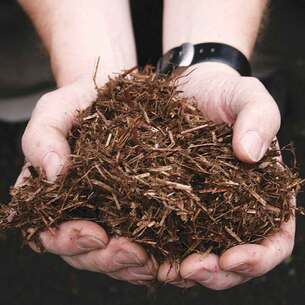
Mulch can be used in many settings in addition to ornamental landscape beds like at my parents’ house. It can help smother annual weeds and reduce or eliminate cultivation, hand weeding and chemical weed control while contributing beneficial organic matter. Mulch can also regulate soil temperatures and soil moisture losses to create an ideal soil microbiome for
plant roots. Organic mulches actually break down which provides nutritional benefits to the soil over time.
There are two basic kinds of mulch, organic and inorganic:
• Organic mulches include formerly living material such as chopped leaves, straw, grass clippings, compost, wood chips, shredded bark, sawdust, pine needles and even paper.
• Inorganic mulches include black plastic and geotextiles (landscape fabrics).
For our purposes organic mulches provide the benefits we are looking for regarding soil health. Choosing a type of mulch is often based on personal preference and appearance. Different types of mulch have different lifespans and different nutritional benefits. For example, red pine and hardwood bark add organic matter to the soil as they decompose but do not supply much nitrogen while mulches from leaf tissue have the added benefit of supplying nitrogen. Mulches derived from leaf tissue can be produced at home from recycled material including compost, ground leaves, and pine needles. More about at home composting can be found here.
The general rule of thumb when it comes to applying mulch is to spread it about two to four inches thick over the soil surface. It is important to use the correct amount of mulch because if too thick, it can prevent water from reaching the soil. When the mulch layer is too thin, it may not inhibit weed growth or provide its other benefits. It is also important to prepare the surface before mulching. For example, if weed suppression is the goal of mulching, it is important to weed the area before applying mulch.
Overall, mulching can be an incredibly useful tool to improve soil health and control weeds when the proper type and amount is used. Additional sources on mulching and its benefits below:
Mulching 101: When, Why, & How to Mulch Your Garden
How to Choose the Best Types of Mulch to Keep Your Garden Beautiful
-Keely Charles
 RSS Feed
RSS Feed
